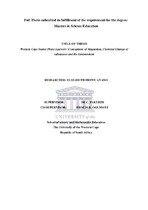Western Cape Senior Phase Learners' Conceptions of Magnetism, Chemical Change of substances and the Environment
Abstract
A large percentage of South African learners held inadequate or alternative conceptions
that might hinder them from developing a valid understanding of various scientific concepts
and generalizations. This study explored the conceptions of Senior Phase learners on
magnetism, chemical change of substances and the environment. More explicitly, the study
attempted to investigate the influence of the learners" age, language and gender issues on their
understanding of these scientific concepts. The study is underpinned by socio-cultural
constructivism as espoused by Vygotsky (1978).
The research sample comprised 250 Senior Phase learners (grades eight and nine) from
secondary schools in the Metro Central District in the Western Cape. The study used the
following six research instruments for data collection: Science Achievement Test (SAT),
Context Test, Cloze Test, Picture Test, Science Vocabulary Test and an interview schedule.
The tests were administered to all the participants while the interview was conducted with six
participants.This study was a descriptive research of a survey type and data was collected and
analyzed using both quantitative and qualitative methods.The data collected was analyzed
quantitatively using the Statistical Package for Sciences (SPSS) in order to obtain descriptive
statistics that were used to explore the conceptions of senior phase learners in magnetism,
chemical change substances and the environment in the Metro Central district while data from
the tape recorder and notes taken during the interview, were analyzed qualitatively.

